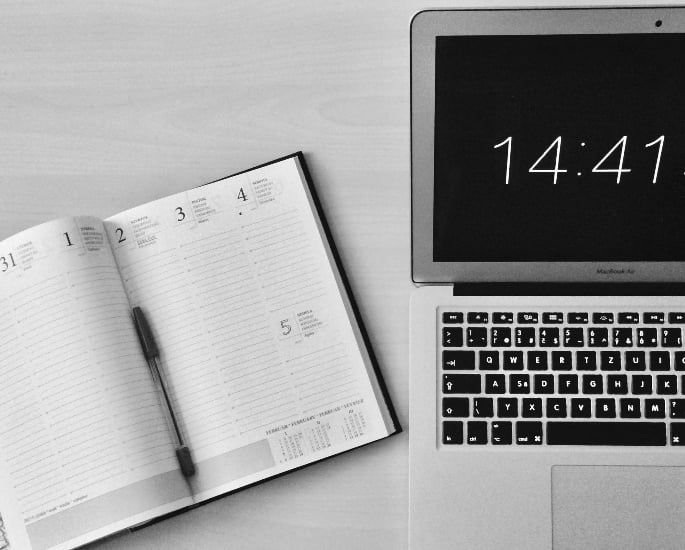Having a good work-life balance is vital for long-term health and well-being.
However, balancing work and personal life can be challenging in the modern world, where people face multiple pressures and demands on their time.
A survey by Bloom UK found that more than nine in 10 (93%) women say they have experienced mental health issues as a result of poor work-life balance.
For British people, including those from South Asian communities, achieving a harmonious work-life balance is crucial for well-being and productivity.
Yet this can be challenged by the value placed on dedication, perseverance, and ambition within Desi cultures.
For Brit-Asians from Pakistani, Indian, Bengali and Sri Lankan backgrounds, the memories and stories of what their parents and grandparents endured and their hard work remain strong.
Grandparents and parents made enormous sacrifices to give the next generation better opportunities. A reality that can mean Brit-Asians can feel pressure to reciprocate by working hard and relentlessly.
Indeed, such a feeling can be subconscious and one a person is not always aware of. Sumera, a 36-year-old British Pakistani, revealed:
“For years, I had this mentality of work, work and work. Make enough money to get the house and take care of my parents.
“I wanted to make them proud and make their lives easier. I forgot to live and almost totally flamed out.”
DESIblitz explores practical strategies and insights to see how Brit-Asians can achieve a work-life balance.
Understanding Work-Life Balance
Work-life balance involves effectively managing one’s time between professional and personal commitments while taking care of oneself.
It’s about ensuring that work does not dominate one’s personal life.
A lack of work-life balance can be detrimental to a person’s long-term health and well-being, both physically and psychologically.
Psychologist Rashi Bilash wrote:
“Our elders may have emphasised the importance of work, but they also valued family and community.
“It’s time we strike that balance, too. Work is essential, but so is our well-being.
“Finding your work-life balance begins with self-awareness.”
“Reflect on what truly matters to you. Are you working for fulfilment or just out of habit?
“Are you giving your personal life the attention it deserves?”
Achieving a work-life balance prevents burnout, reduces stress, and enhances overall well-being.
What work-life balance looks like changes over time and as we age. Lifestyles and personal needs never remain static.
Nevertheless, there are strategies all Brit-Asians and others can undertake to help facilitate a good work-life balance.
Set Clear Boundaries Between Work and Personal Life

One of the foundational steps towards achieving a work-life balance is setting clear boundaries between work and personal time.
The advent of technology has blurred these lines, making it easy for work to infringe upon personal time.
Setting boundaries is not about being rigid or uncaring; it is about protecting your well-being and making time for activities that nurture it.
To establish boundaries, individuals should define their work hours and stick to them as closely as possible. This might mean avoiding work emails and calls after a certain time in the evening.
Mohammed, a 25-year-old British Bengali who works in a small charity, stated:
“Don’t have work emails set up on your phone. If you do, turn off notifications for anything to do with work once you leave the office.
“Unless agreed over time, you are done once your work day is done. The boss or any staff shouldn’t be messaging or calling you.
“When you’re passionate about something, it’s easy to let boundaries blur; in the long run, you’ll regret it. I did.”
“My old boss decided out of nowhere I couldn’t claim back overtime, saying ‘manage your time better’. Claiming back wasn’t in pay but coming in later or leaving early.
“Any overtime done was because she asked for my help.
“Once she said that I noticed other things. I was giving too much to work and having no time for my family and friends.
“Left that job early 2024, and in the new job keeping boundaries firm.”
Creating a clear separation between work and leisure/personal time allows your mind to rest and recharge.
Learn to Say No

Learning to say no is a crucial skill in achieving a work-life balance.
Overcommitting to tasks, meetings, or social obligations can lead to stress and exhaustion.
Saying no is not about rejecting opportunities but understanding your limits and protecting your time for activities that align with your priorities.
Adam*, a 30-year-old British Indian, maintained:
“My manager once came to me with a pile of folders to do work outside my job role. It was awkward, but I said it was ‘outside the remit of my role’.
“At the time, I was already doing more work to cover for a colleague who was off sick. The manager wasn’t happy, but it was the right move for me.
“My manager knew I was right. He just didn’t want to outsource the work even though the organisation had the funds.”
Similarly, 34-year-old British Pakistani Sonia said:
“It’s hard when opportunities come that I know would have been valuable for my career, but I’ve had to say no.
“I learnt the hard way; I never want to burn out again. At one point, scared to miss out or make a bad impression at work, I was saying yes to everything.
“I was so overworked and stressed I was barely eating, dry heaving, couldn’t sleep, and spending no time with family. I forgot to live.
“Learning to say no is a painful skill to develop, but much needed. I wish I had started to say no sooner.”
Sonia also worked as a freelancer for a year and advised:
“It’s easy to be taken advantage of when you’re nice; sometimes, people asking don’t think.
“I had to force myself to say no; I can only do that unless I’m paid. I was technically on a freelancer contract, but only cos it saved the company money.
“Know your worth, and no matter how scared or uncomfortable you feel, say no when you need to.”
Prioritise Time Management and be Honest

Effective time management is another critical aspect of achieving a work-life balance.
Without proper time management, it’s easy for work tasks to spill over into personal time and to feel stressed and under pressure.
Prioritising tasks, setting realistic deadlines, and using tools like calendars and task managers can significantly improve time management.
This can also mean having honest conversations with your line manager when needed. Simran*, a 28-year-old British Indian, asserted:
“I was working part-time, and the company was expanding.
“It meant that despite managing my time really well, I couldn’t do all the tasks assigned within my allocated paid hours.
“I was one person. So, I requested a conversation with my line manager and told her this. She asked me to take on more days, which I couldn’t do because of my personal responsibilities.
“After a while, she had no choice but to hire another part-timer. She and the director reviewed what I’d been doing and the organisation and found I had been spot on in my feedback.
“I know it could have gone the other way, but if it had, I would have found another job, no matter how long it took.
“But as my family reminded me, I was an ‘asset and needed to remember that’.”
Switching off after your work day is important to help you take time for yourself and your loved ones. Sabrina, a 30-year-old British Kashmiri, said:
“After Covid and lockdown, it’s been great in my workplace, including flexible working.
“I work home two out of five days, but it means I have to manage my time well and set alarms.
“When I’m working, I get absorbed. I’ve had to set alarms, so I have mini breaks, remember lunch and clock off on time.
“I don’t get paid for overtime and am no longer foolish where I’ll do it. I have at an old workplace, and it was a mistake.
“The alarms have meant I spend relaxing evenings with family or friends rather than hunched over my laptop working.”
Take Regular Breaks and Holidays

Taking regular breaks during the workday and using annual leave is vital to maintaining a work-life balance.
Short breaks throughout the day can help refresh your mind, reduce stress, and improve productivity.
Stepping away from the desk, even for a few minutes, can significantly affect focus and energy levels.
Sonia, reflecting on her workday, stated:
“I use five or 10 minutes of my lunch break to go and get some fresh air unless it’s raining. It’s helped so much, and I never have lunch at my work desk.
“My manager has made it an informal policy since he noticed many of us were trapped at our desks all day, including lunch.”
Annual leave is equally important. Many people hesitate to take time off, fearing it might impact their work or career progression.
However, taking holidays and breaks from work is crucial for resetting and recharging.
Sonia, thinking about the freelance work she did in the past, revealed:
“When I was ‘freelancing’, I took breaks regularly in between work while ensuring I worked all my paid hours.
“Freelancing made holidays tricky since there is no paid annual leave.”
“One manager once said, ‘If you take a holiday, you’ll need to do stuff in advance’.
“At first, I was like ‘yeah’, but then I realised yes, only under conditions. Yes, if it can be done on my paid workdays, which wouldn’t be possible.
“Or they let me work the paid days I’d miss earlier in the month, so I still get my money, and they get what they need.
“Sometimes people do not think; you have to be blunt.”
Practice Self-Care

Self-care is vital to achieving and maintaining work-life balance. Engaging in relaxing and rejuvenating activities is essential for mental and physical health.
This could include exercise, yoga, hobbies, spending time with loved ones, or simply having a quiet moment to yourself.
Dr Radha Modgil, a GP and wellness expert, stressed that self-care “is not selfish or self-centred – it’s selfless and centred on yourself”.
She added: “Is a ‘must’ not a ‘maybe’ – you matter.
“Is what you want to be – it’s about you, what you need in that one moment, what works for you.”
Taking time for yourself reduces stress, boosts mood, and helps facilitate overall well-being. Self-care enables a person to function better at work and cannot be ignored.
Regular physical activity, adequate sleep, and healthy eating are fundamental aspects of self-care that contribute to a balanced life.
Mindfulness practices like meditation or yoga can also help manage stress and improve focus. These practices encourage living in the moment, reducing anxiety about future tasks or regrets about the past.
It can be challenging to find a work-life balance, but developing such a balance is vital.
As psychologist Rashi Bilash emphasised: “We need to change the narrative.
“Success isn’t just about grinding endlessly; it’s about leading a fulfilling life.”
“Our ancestors may not have had the luxury of ‘work-life balance’ as we know it, but they understood the importance of joy, relationships, and moments of respite.
“Like it or not, we live in a world that constantly pushes the message of productivity and efficiency at work – even to the detriment of our health.
“This is the case even as research tells us it is ultimately not in anyone’s interest, including employers: we know that burnout is a very real consequence of ignoring our work-life balance.”
For Brit-Asians, finding work-life balance does not mean letting go of previous generations’ values about work. Instead, it is about recognising the need to create a fulfilling life.
A fulfilling life means ensuring personal needs and relationships are nurtured and protected.
Accordingly, by, for example, setting boundaries at work, saying no and taking time for self-care, Brit-Asians can thrive professionally and gain personal happiness.
Remember, work-life balance is not about perfection but creating a harmonious life that aligns with a person’s values and priorities.





